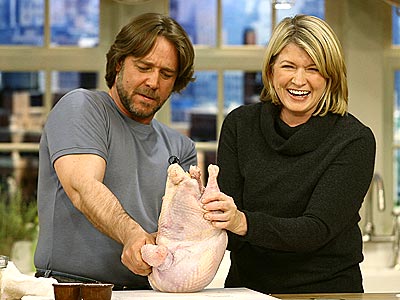Did Martha Stewart Give Herself Food Poisoning?

Did domestic diva Martha Stewart get salmonella food poisoning this Thanksgiving?
Looks that way.
Stewart, who prepared several Thanksgiving turkeys began to feel ill later that day. She experienced “body aches, stomach bloating and severe pain” and had to see a doctor who thought she might be suffering from a salmonella food infection.
It should be noted that no one else became ill from the food (however I assume that they did not take part in handling the raw turkeys).
The diagnosis has not been confirmed, but she did receive treatment for it. NBC News spoke to Stewart today, and she is feeling much better.
What is Salmonella?
Salmonella is group of bacteria that can cause diarrhea in humans. They are microscopic living creatures that pass from the feces of people or animals to other people or other animals. Salmonella is one of the most common causes of food poisoning in the United States.
Salmonella comes from two sources:
- Food: Contaminated eggs, poultry, meat, unpasteurized milk or juice, cheese, contaminated raw fruits and vegetables (alfalfa sprouts, melons), spices, and nuts (Remember the recent outbreaks in peanut butter and melons?)
- Animals and their environment: Particularly reptiles (snakes, turtles, lizards), amphibians (frogs), birds (baby chicks) and pet food and treats.
What are the symptoms of salmonellosis?
Although some people with salmonellosis remain asymptomatic, most people experience diarrhea, abdominal cramps, and fever. The symptoms begin within 8 to 72 hours after the contaminated food was eaten.
Additional symptoms may be chills, headache, nausea, and vomiting. Symptoms usually disappear within 4 to 7 days.
Many people with salmonellosis recover without treatment and may never see a doctor. However, Salmonella infections can be life-threatening for certain groups of people:
- infants and young children
- pregnant women and their unborn babies
- older adults
- people with weakened immune systems (such as those with HIV/AIDS, cancer, diabetes, kidney disease, and transplant patients).
How can I prevent salmonellosis?
- Avoid eating high-risk foods, including raw or lightly cooked eggs, undercooked ground beef or poultry, and unpasteurized milk
- Keep food properly refrigerated before cooking.
- Clean hands with soap and warm water before handling food. Clean surfaces before preparing food on them.
- Separate cooked foods from ready-to-eat foods. Do not use utensils on cooked foods that were previously used on raw foods and do not place cooked foods on plates where raw foods once were unless it has been cleaned thoroughly.
- Cook foods to a safe internal temperature. Use a meat thermometer to make sure foods are cooked to a safe temperature.
- Chill foods promptly after serving and when transporting from one place to another.
- Wash your hand after contact with animals, their food or treats, or their living environment.



























0 comments